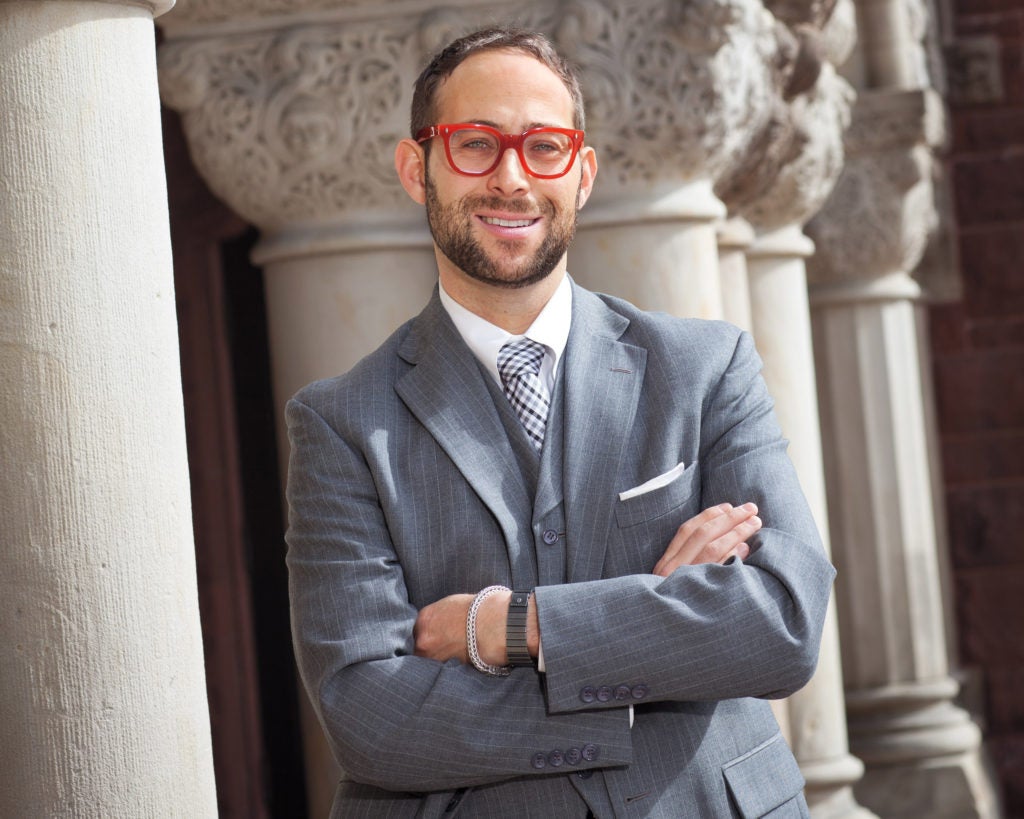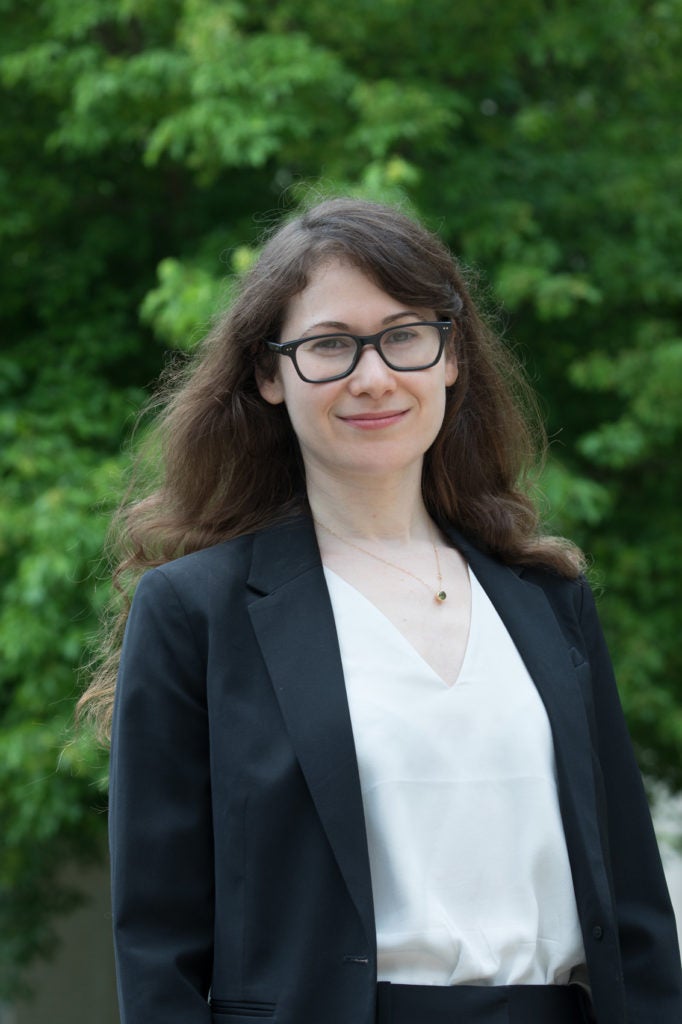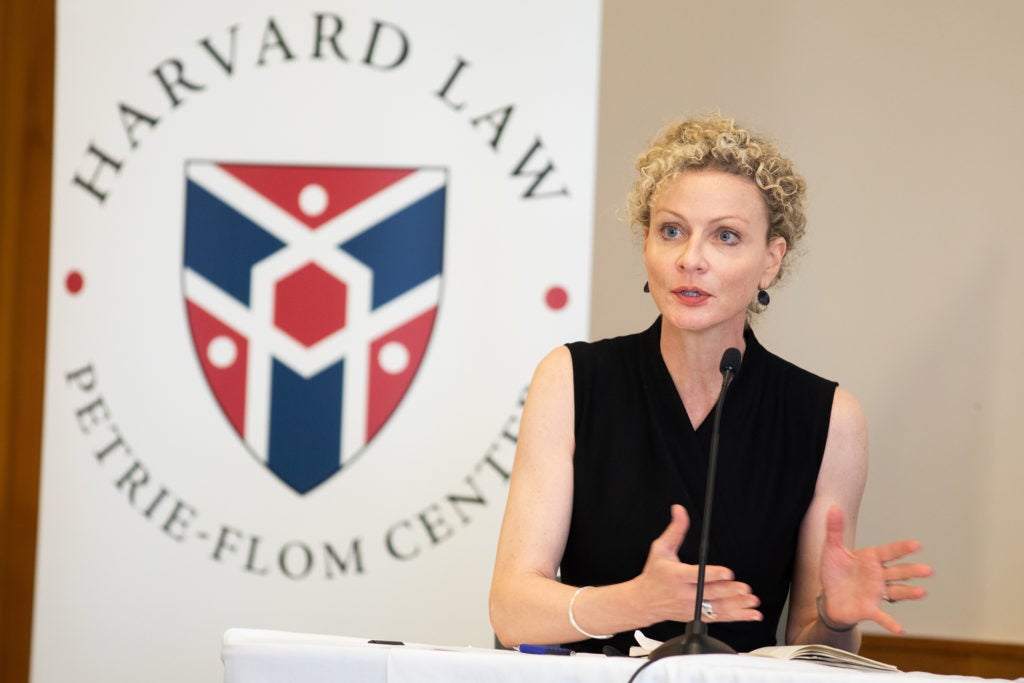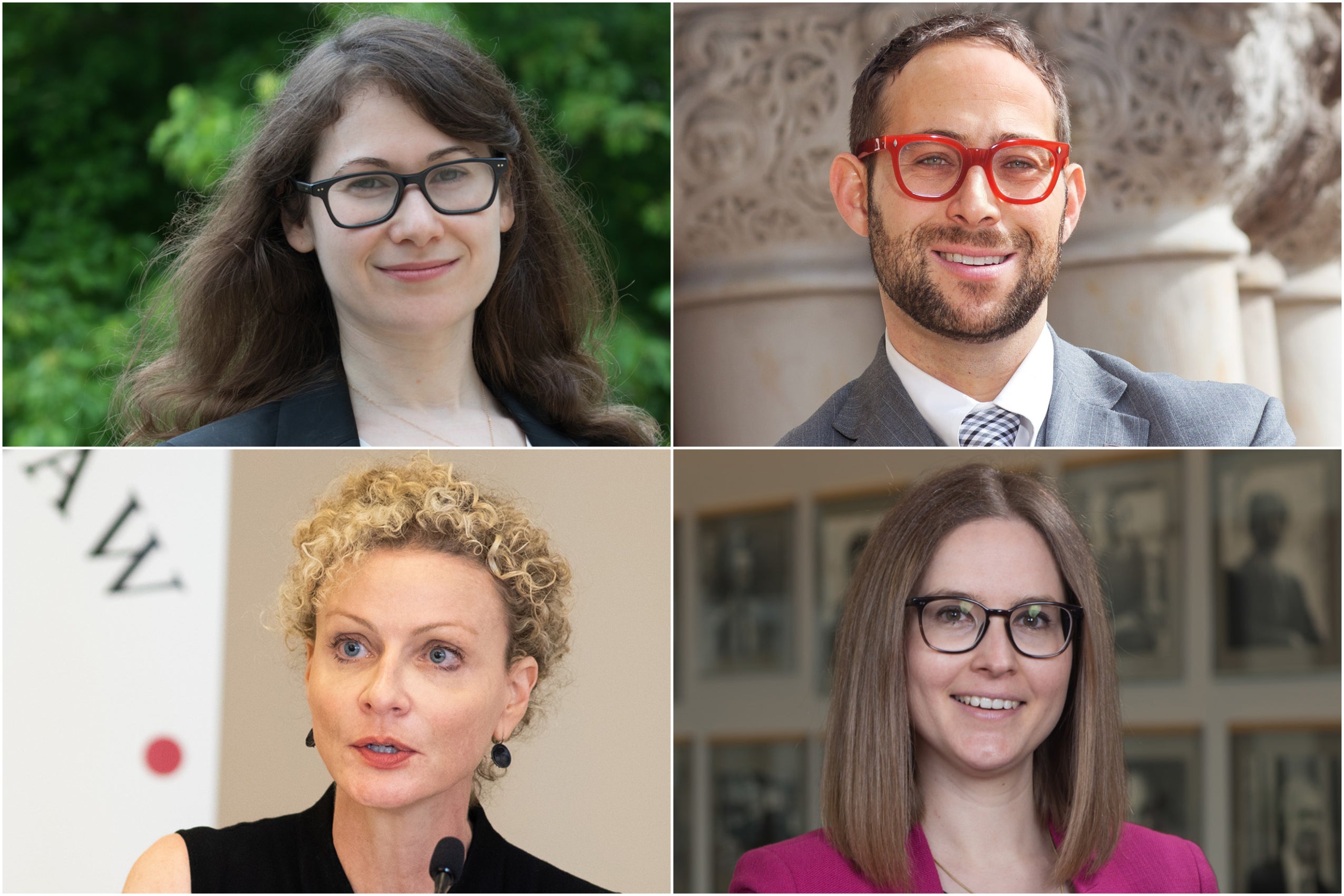Fifty years from now, will some of the emergency decisions being made today to combat the spread of the COVID-19 pandemic be remembered as critical, necessary steps or reprehensible human rights violations, comparable to the internment of Japanese Americans during World War II?
As governments impose unprecedented restrictions on people and businesses, and as the possibility grows that doctors may soon be forced to decide which patients get access to critical medical services in short supply, scholars at the Petrie-Flom Center for Health Law Policy, Biotechnology, and Bioethics at Harvard Law School are working to raise important legal and ethical questions about health care delivery and the enactment of extraordinary public health measures in response to the ongoing epidemic.
I. Glenn Cohen ’03, faculty director and James A. Attwood and Leslie Williams Professor of Law; Carmel Shachar J.D./M.P.H. ’10, executive director; Alicia Ely Yamin J.D./ M.P.H. ’91, senior fellow in Global Health and Rights and Research Fellow, Medicine, Artificial Intelligence, and Law; and Sara Gerke, research fellow, Medicine, Artificial Intelligence, and Law, recently discussed these questions with Harvard Law Today.
What are some of the challenges related to addressing this pandemic from the standpoint of health law scholarship?
I. Glenn Cohen: Especially when it comes to the constitutional precedents, many of the challenges are turn of the 20th century. You can look at this case law and make best guesses about what a court would say, but to what extent do you need to think about how more than 100 years of, say, Equal Protection and Procedural Due Process jurisprudence should change your answer?

As always there is also a gap between the law on the books and the law in the world as actually practiced. I, for example, suspect that when it comes to injunctions and the like many courts will dodge precedent to allow governors and local officials to proceed with plans, but then wring their hands on the back end once the emergency has passed. Some of that may be healthy for a court system, but I do worry about finding ourselves on the other end of history with the next Korematsu v. United States, a case, now quite reviled, that legitimized as constitutional the WWII internment of Japanese Americans.
Sara Gerke: We currently face many challenges, such as those related to access to care and privacy. When the health system can no longer cope with the situation and we do not have enough masks for health care workers or lifesaving ventilators for patients, we will face ethical challenges in the U.S. and need to make tough ethical decisions, as Italy currently has to make. For example, who will receive a ventilator and who won’t? On what criteria should such decisions be made? We also need to remember in times of crisis that some privacy violations cannot be undone post-outbreak.
There have been a slew of articles written on COVID-19, but what sort of topics related to the pandemic still need to be addressed?
Cohen: Questions about liability for disconnecting individuals from ventilators as part of triage protocols as some are recommending we do, potentially against people’s wills; rethinking the current state of Medicaid expansion and access to the Affordable Care Act exchanges in light of the likely huge impacts of COVID-19 on unemployment rates; and the poor adherence to the 2005 International Health Regulations that are supposed to govern how 196 countries and WHO collectively address the global spread of disease and avoid unnecessary interference with international traffic and trade.

Carmel Shachar: We’re doing some thinking about how to translate these conceptions, such as ventilator allocation, into deliverables that can be used “on the ground.” If you are a physician having to make the call about which patients get limited resources, how can we translate our scholarship to help you? If you are a policy maker thinking about how to fast track technology that can help address medical needs right now, such as sensors to monitor patients at home, how can we present our work to help guide you?
What sort of long-term impacts do you foresee the pandemic having on health law policy, biotechnology, and/or bioethics?
Shachar: I think that the pandemic will push us to think creatively about the delivery of health care. We were already dipping our toe into the waters of telehealth before COVID-19. Now there is a huge incentive to make telehealth work and implement it quickly. You can see an example in the relaxation of rules around Medicare telehealth. In a post-pandemic world, we’ll likely continue to embrace telehealth much faster than we would have otherwise. You can’t unring most bells when it comes to health policy, which is why it is so important to implement it correctly, even in an emergency situation.
Alicia Ely Yamin: We need to be concerned about the long-term implications of restrictions ushered in quickly for erosion of accepted principles of human rights, constitutional guarantees, rule of law and good governance. As after 9/11, it may seem legitimate in this public health crisis to limit a great many rights in the name of public health, but what are the prospects of reversing these measures in countries already under the thumb of populist autocrats, and might this foster a greater slide toward illiberal democracy?
There is no way anybody could have predicted the COVID-19 pandemic, but has any work from the Petrie-Flom Center referenced anything similar in scale?
Cohen: I have done some writing on rationing in the past focused on what law can learn from organs, pandemic flu, etc. Sadly some of that learning will be sorely needed now as the health effects from the pandemic and our reactions to them will give rise to shortages by legal service providers dealing with the economic and employment and housing tolls of this pandemic. They will need to decide who to prioritize when they can’t help everyone. Our second-ever edited volume from a Petrie-Flom conference, 2013’s The Globalization of Health Care: Legal and Ethical Issues, addresses among other things “The New Global Framework for Pandemic Influenza Virus and Vaccine Sharing.” In the public health law chapter of my co-authored casebook from 2018, Health Care Law and Ethics 9th edition, we review in depth the constitutional and statutory law about contact tracing, quarantine, isolation, etc. Finally in my co-authored casebook that just came out, Readings in Comparative Health Law and Bioethics 3rd edition, we review the history and compare the responses of multiple countries from SARS to Ebola. It is very sad to think that when we went to print COVID was not yet on the horizon.
Shachar: In October 2018 we co-hosted Outbreak Week with the Harvard Global Health Institute. Outbreak Week was a five-day series of conferences exploring how prepared we are for the next big health crisis. We looked at the role of media in the age of contagions, how to prevent epidemics in a connected world, and the development of vaccines for outbreaks. We had Dr. Anthony Fauci come and talk about pandemic preparedness during Outbreak Week for example. Videos from all of our past events are posted online and we’ll highlight some particularly relevant talks on our social media and blog.

Yamin: Working in global health, I would not say that this was totally unpredictable, either in terms of the possibility of a pandemic—although we did not know it would be exactly like this—nor in terms of the legal gaps in the global health security agenda. In relation to the latter, Scott Burris’s Public Health Law Research group had been developing policy surveillance tools with the U.S. Centers for Disease Control & Prevention to assess national laws across Sub-Saharan Africa precisely in order to prevent, detect, and respond to such outbreaks. As I understand it, funding for this work was suspended by the Trump Administration but clearly needs to be taken up again in light of lessons from the current crisis.
Second, I think this pandemic raises questions about the effectiveness of the International Health Regulations (IHR), which was significantly revised after SARS. It may well need to be revised again, in light of COVID-19, and we may need a series of broader conversations about global health governance, including structuring and financing institutions that are fit for purpose.
Third, it’s painfully evident that if a ‘right to health’ is going to remain a useful frame, we need to grapple with inexorable trade-offs and show how human rights is relevant to financing and structuring a health system, and meeting health needs fairly, when—as Norman Daniels would remind us—all health needs invariably cannot be met. Similarly, it is equally evident that after decades of imposing different iterations of austerity and shackling them with debt, crumbs of “international assistance and cooperation” are not going to enable governments in the global South to respond adequately to this crisis. Perhaps the most useful research agenda in my view would include some analysis of the intersections between legal frameworks and the political economy of the avoidable suffering wrought or exacerbated by this pandemic.
What have been your reactions to the national and global response to the pandemic?

Gerke: Today it is more important than ever – and this is something that policymakers around the world currently emphasize – that each of us must work together and practice social distancing. The future and outcome of this pandemic will depend to a large extent on the actions of each individual person. I encourage all to help to mitigate this pandemic by staying at home, if possible, and practicing social distancing. The lives of many people are laying in our hands. I also want to express here my gratitude to all health care workers and many others who are currently navigating us through this crisis.
How has the COVID-19 pandemic impacted your work with Petrie-Flom and your scholarship more broadly?
Cohen: I have been answering a lot of media questions on topics people really are worried about: can hospitals turn people away from the ER if they are showing COVID-19 symptoms? How do we ration ventilators ethically? What are the constitutional limitations on quarantine orders? We have already done one rapid-response white paper, and I am sure we will also be getting our ideas out in more formal publications as well.
Gerke: The COVID-19 pandemic has an impact not only on our work—we are all currently doing home office—but on the entire world, and the way how we live and perhaps practice medicine in the future. These days, telehealth has become tremendously important. The use of video chats and smart home devices is expected to further grow in the future. But with this dissolution of the boundaries between hospital and home, we also face ethical and legal challenges that we need to address, such as data privacy issues.
Yamin: In global health law, the novel coronavirus early on raised issues relating to the International Health Regulations, which are triggered by the WHO’s declaration of a “PHEIC”, a public health emergency of international concern, and not by a declaration of a pandemic. In early February, I argued in the Lancet along with a group of global health law experts from around the world that the IHR restricts the measures countries can implement when addressing public health risks to those measures that are supported by science, commensurate with what is known about the risks involved, anchored in constitutional rights protections, etc. The rationale behind the IHR is that countries should not take measures that could do more harm than good by, for example, disincentivizing countries from reporting data accurately and transparently to international authorities. President Trump has touted his border closing as hugely successful in stemming the number of cases initially. However, we really don’t know enough, and there are an array of confounding factors to evaluate the intended and unintended impacts, as compared for example to ramping up massive screening and rapid testing at all points of entry.
As things have progressed to focus more on what countries are doing domestically, I’ve answered media questions about human rights, highlighting primarily the differential effects of both the virus and the responses on diverse persons, from prisoners to women confined with their abusers. And underscoring that, if there were any remaining doubt as to how inefficient, as well as unethical and inconsistent with human rights, our health care system is, this pandemic should put those questions to rest.
How has COVID-19 changed Petrie-Flom as a center at Harvard Law School?
Shachar: We had an ambitious slate of events planned for the spring semester, including an International Regulators’ Roundtable on Health Artificial Intelligence. Obviously, we’ve had to rethink our approach now that in-person events are out of the question. Some of these events, such as one on the impact of medical debt in Africa and the U.S., are being turned into livestreamed events. Others, such as our conference on the regulation of medical devices are turning into podcasts. We’ve noticed that a lot of people are registering for our livestreamed events, which shows that people are hungry to engage with health law and bioethics right now. We’re working hard to expand our digital presence to serve our community. If you subscribe to our newsletter you can stay up to date on all the programming we’ll be virtually offering.
Gerke: The Center does not only consult on the ethics and law of COVID-19 but is also currently working on scholarly articles in the field, especially in relation to the Center’s Project on Precision Medicine, Artificial Intelligence, and the Law.
